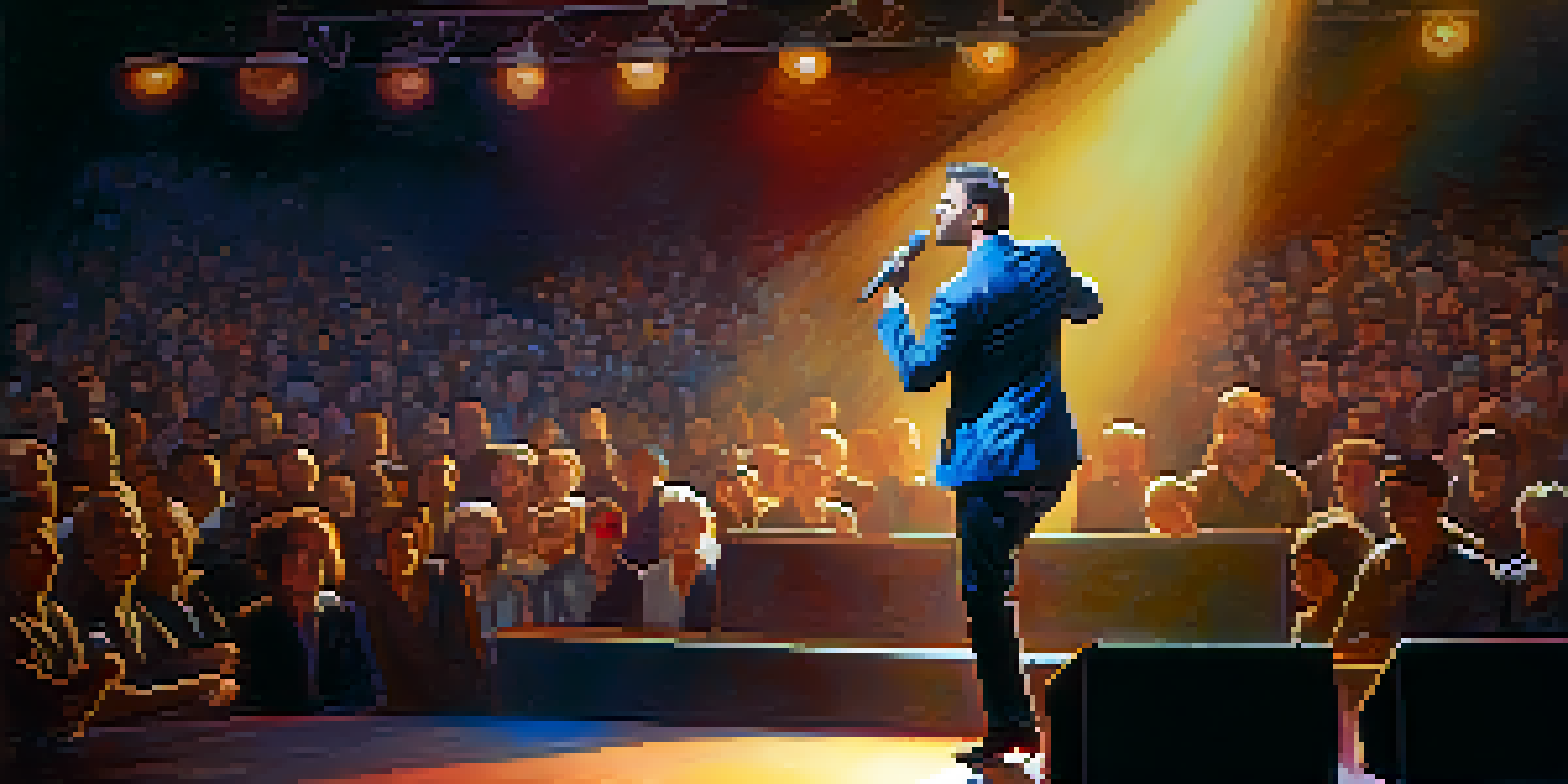Building a Magic Persona: The Importance of Stage Presence

Understanding the Essence of Stage Presence
Stage presence is the magnetic quality that draws an audience in and keeps them engaged. It’s not just about what you do on stage but how you make your audience feel. Think of it as the energy that resonates from you, creating a connection that is both captivating and memorable.
Stage presence is not just about what you do; it's about how you make your audience feel.
A performer with strong stage presence can transform a simple act into an extraordinary experience. Just like a great storyteller, they take their audience on a journey, evoking emotions and sparking imagination. This ability to connect emotionally can turn a good performance into a great one.
To build this essence, one must focus on authenticity and confidence. When performers believe in their craft and embrace their unique style, it shines through, making their stage presence feel natural and compelling.
The Role of Body Language in Captivating Audiences
Body language plays a crucial role in stage presence. It includes gestures, posture, and facial expressions that communicate emotions and intentions without words. A confident stance can signal authority, while open gestures can invite the audience into your world.

Consider how a magician uses dramatic pauses or sweeping arm movements to heighten suspense and intrigue. Each movement should feel deliberate and synchronized with the performance, adding layers of meaning and excitement to the act.
Stage Presence: Connect Emotionally
Strong stage presence draws the audience in and turns performances into memorable experiences through emotional connections.
Practicing your body language in front of a mirror can be incredibly beneficial. This allows you to see how your movements translate to an audience and refine them until they feel just right, enhancing your stage presence.
Voice Control: The Power of Tone and Inflection
Your voice is one of your most powerful tools in creating stage presence. Varying your tone, volume, and inflection can evoke different emotions and keep the audience engaged. Just like a musician, mastering your vocal range can add depth to your performance.
The best way to capture an audience's attention is to give them a piece of you.
For instance, a soft whisper can create intimacy, while a booming voice can command attention. These contrasts can guide the audience’s emotional journey, making them feel what you want them to feel at any moment.
Practicing voice modulation exercises can help you discover your vocal range. This practice encourages you to play with sounds, tones, and rhythms, ultimately enhancing your overall stage presence.
Creating a Unique Persona: The Magic of Character
Building a magic persona is about creating a character that resonates with your audience. This character should reflect your unique qualities while also being relatable. Think of it as a heightened version of yourself that embodies the emotions and themes of your performance.
For example, a magician might create a whimsical character that plays with the audience's imagination. This persona can help to captivate the audience, making them more invested in the narrative of the performance.
Body Language Enhances Engagement
Effective body language, including gestures and posture, communicates emotions and invites the audience into the performance.
To develop your character, consider what traits you want to emphasize and how they align with your performance style. This deeper connection to your persona can enhance your stage presence and make your performance unforgettable.
Engaging with the Audience: Building a Connection
Engaging with the audience is essential for captivating stage presence. This can be achieved through eye contact, audience interaction, and responding to their energy. When you acknowledge your audience, it creates a shared experience that elevates the performance.
Imagine a magician who includes audience members in their tricks—this not only entertains but also makes the audience feel like they are part of the magic. This connection fosters a sense of community and excitement.
To enhance audience engagement, practice reading the room and adapting your performance based on their reactions. This responsiveness can make your performance feel dynamic and alive.
Practicing Mindfulness: Staying Present on Stage
Mindfulness can significantly enhance your stage presence by keeping you focused and present during your performance. This means being aware of your surroundings, your audience’s reactions, and your own feelings in the moment. It helps to reduce anxiety and allows for a more genuine performance.
For instance, taking a few deep breaths before stepping on stage can center you, grounding your thoughts and emotions. This practice can make you more attuned to the energy of the performance, allowing for a more fluid connection with your audience.
Continuous Improvement is Key
Reflecting on performances and seeking feedback fosters growth, helping performers refine their stage presence over time.
Incorporating mindfulness techniques into your rehearsal process can also be beneficial. It encourages you to stay present with your material, making you more adaptable and confident when it’s showtime.
Continuous Improvement: Learning from Each Performance
Stage presence is not a one-time achievement; it’s a skill that requires continual honing. After each performance, take time to reflect on what worked well and what could be improved. This reflective practice fosters growth and enhances your overall presence on stage.
Consider keeping a journal of your performances, noting audience reactions and personal feelings. This can provide valuable insights into your strengths and areas for improvement, guiding your future performances.

Engaging with fellow performers for feedback can also be invaluable. They can offer perspectives you may have overlooked, helping you to refine your stage presence and develop your unique magic persona.